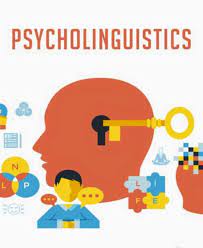Psycholinguistics
Since language is a mental phenomenon, mental processes are articulated in language behaviour. Psycholinguistics studies these mental processes, processes of thought, and concept formation and their articulation in language, which reveal a great deal about the structures of both human psychology and of language.
Cognitive psychology is the area which explores how meanings are understood by the human brain, how syntax and memory are linked, how messages are decoded and stored.
Psycholinguistics also studies the influence of psychological factors such as intelligence, motivation, anxiety etc. on the kind of language that is understood and produced. For instance, in the case of errors made by a speaker, there may be psychological reasons which influence comprehension or production that are responsible for the occurrence of an error. Our perception of speech sounds or graphic symbols (in writing) is influenced by the state of our mind. One kind of mental disability, for eg, results in the mistakes made by children in reading when they mistake one letter for another (Dyslexia). Psycholinguistics can offer some insights and corrective measures for this condition.
Psycholinguistics is concerned with the learning of language at various stages: the early acquisition of a first language by children and later stages in acquisition of first and other languages. Psycholinguists attempt to answer questions such as whether the human brain has an inborn language ability structured in such a way that certain grammatical and semantic patterns are embedded in it, which can explain how all human beings are capable of learning a language. This exploration may lead us to determining whether all the languages in the world have some ‘universal’ grammar that lies in the mind of every human being and is transformed in particular situations to produce different languages.
Psycholinguistic studies in language acquisition are very useful in the area of language teaching because they help teachers to understand error production and individual differences among learners and thus devise appropriate syllabi and materials for them.
One specialized area within psycholinguistics is neurolinguistics that studies the physiological basis of language and language disorders such as aphasia, loss of memory, etc.
Another relation of language with mind is that of logic. It was held by some ancient philosophers that the human mind is rational and capable of thinking logically and, therefore, language too is logically ordered and rational. Others held that, just as irrationality is present in the mind, irregularity or anomaly is present in human language. Since then there has been a debate about the nature of language and the relation between language and logic. One of the problems discussed by philosophers of language is whether language can be an adequate medium for philosophical inquiry. Since all our thoughts are known to us through language, we must examine the kind of language we use when we approach philosophical issues and analysis.






No comments:
Post a Comment